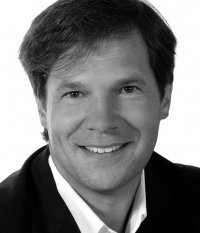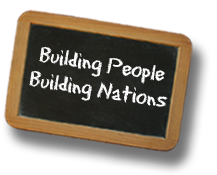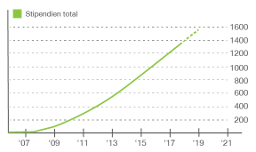Our clear focus on sustainable impact and newly launched goal to empower 1'000 Young Entrepreneurs have allowed us to take the lead.
Blog
INTERVIEW MIT PROF. DR. CHRISTOPH FREI
Posted on 06/20/2011 at 05:45PM
Since 2006, Christoph Frei is titular professor for political science and member of the program committee International Affairs & Governance at the University of St. Gallen. He agreed to support the Aiducation International city team in St. Gallen as a mentor for projects with advice, critical feedback and personal contacts.

Für die Deutsche Version bitte weiter nach unten scrollen/Please scroll down for the German Version
Aiducation International (AI): Mr. Frei, since a long time you are a critic of classical development aid. What damage does it cause?
Christoph Frei (CF): Development aid does cause harm, when it uses the wrong incentives. If money flows are automated, desires are raised and long-term dependencies develop, at the same time corruption cedes. This “sweet an big cake” increases the discretionary decision power of governments and leads almost always to the cementation of authoritarian political systems. Those who strive for success are trying to get as close as possible to the “honey pots” and their allocation; this path, straight towards the money is much more attractive as hard work, saving and abstinence.
AI: Development aid enhances corruption. How does this impede development?
CF: By receiving development funds from abroad on a regular basis, any incentives for hard work and long-term efforts to build up competitive market structures disappear. But this is exactly what sustainable development comprises. Large parts of Africa have enormous economic potential, not least due to an affluence of various natural resources. What is lacking, are healthy, stable institutions; Furthermore, there is no socially beneficial inclusion of political power. African elites are primarily thinking about their own benefits – how they themselves can best benefit from the sale of resources. Sustainable investments are rarely planned and carried out.
AI: Very often, there is talk about the strong dependencies and a sort of modern colonialism.
CF: Dependencies – yes, particularly the classical development aid keeps African societies captured in a strong dependency. The term “aid” alone creates and enforces such hierarchies. Those who give are superior to those who receive. How much more helpful would it be, if societies could empower themselves instead of living of aid. For decades, Egypt was one of the most prominent recipients of US aid. And a large share of this aid has been channeled towards a small corrupt elite and its security apparatus. Now, Egyptians are taking matters in their own hands – how great they have to feel about this! Sustainable development has to emerge from the inside; development from the outside mostly creates more problems than it is actually solving.
AI: Why did you as a critic of classical development aid decide to support Aiducation International?
CF: Aiducation International follows a different approach than classical development aid does. It aims at self-responsibility and thus at the core of the problem. AiduMakers pay for the tuition fees of talented young people and future leaders, who for financial reasons have no access to secondary school. In connection with the ideal training at the Mentorship Academies, the education of the scholars contributes to the development of human capital locally and therefore to the solution of problems within the country. Training and education – these are very likely the best instruments for self-help and for the sustainable development of the country.
AI: What motivates you additionally to support Aiducation International?
CF: The organization builds on highly motivated and socially engaged young people, who know from personal experience, the benefits and advantages of good education. The business model of Aiducation is simple and transparent – this creates trust. Furthermore, the team is open for new ideas, proposals and critical comments. This is also where I see my role as a mentor and critical partner.
AI: Well, you wouldn’t be our critic, if you couldn’t also give us a few tips. Which would those be?
CF: For the overall credibility it will be extremely important to follow up on good intentions with good performance. For example; according to which criteria does the allocation of scholarships take place? How do we analyze whether a 14year-old Kenyan girl is indeed talented and needy? How do we guarantee that scholarships actually benefit the kids through school infrastructure and other material as well as immaterial goods, and do not enrich the administrators of these scholarships? We humans are made of “twisted wood”, there will always be misuses. Minimizing those as much as possible – this is what we have to strive for, this is what we have to work on.
AI: Thank you for your time.
The interview was conducted by the Aiducation International City Team in St. Gallen. For further information in regards to the points raised in Prof. Frei’s answer to the last question, please refer to the FAQ section of our website.
Deutsche Version/German Version
Christoph Frei ist seit 2006 Titularprofessor für Politikwissenschaft und Mitglied der Programmleitung International Affairs an der Universität St.Gallen. Er hat sich bereit erklärt, als Mentor des City Teams St.Gallen die Projekte von Aiducation International mit Ratschlägen, kritischen Fragen und persönlichen Kontakten zu unterstützen.
Aiducation International (AI): Herr Frei, Sie sind selbst seit langem ein Kritiker von Entwicklungshilfe. Wem kann sie denn schaden?
Christoph Frei (CF): Entwicklungshilfe schadet dort, wo sie falsche Anreize setzt. Wenn Gelder automatisch fliessen, werden Begehrlichkeiten ebenso wie anhaltende Abhängigkeiten geschaffen, wird auch Korruption alimentiert. Es ist ein grosser, süsser Kuchen da, der die diskretionäre Verfügungsmacht der Regierung vergrössert und fast immer zu einer Zementierung autoritärer politischer Systeme führt. Wer Erfolg anstrebt, muss versuchen, möglichst nahe an die Honigtöpfe und deren Verteilung zu kommen: dieser Weg zum Geld ist viel attraktiver als der Weg über Arbeit, über Sparen und Verzichten.
AI: Entwicklungshilfe fördert also Korruption. Wie behindert dies Entwicklung?
CF: Wenn Sie routinemässig Entwicklungsgelder aus dem Ausland erhalten, entfällt jeder Anreiz, in mühevoller und langwieriger Arbeit markt- und wettbewerbsfähige Strukturen aufzubauen. Genau das aber wäre ja unter wirklich nachhaltiger Entwicklung zu verstehen. Weite Teile Afrikas haben echtes ökonomisches Potential, nicht zuletzt aufgrund einer Vielzahl natürlicher Ressourcen. Was fehlt, sind gesunde, stabile Institutionen; was überdies fehlt, ist die sozialverträgliche Einbindung auch von politischer Macht. Afrikanische Eliten denken zuerst und auch zuletzt an sich – und also daran, wie sie selbst vom Erlös aus dem Verkauf von Ressourcen am besten profitieren. Nachhaltige Investitionen werden kaum geplant oder getätigt.
AI: Vielfach wird auch von starken Abhängigkeiten und einem modernen Imperialismus gesprochen.
CF: Abhängigkeiten: ja – und gerade die klassische Entwicklungshilfe hält afrikanische Gesellschaften in solchen Abhängigkeiten gefangen. “Aid” heisst Hilfe – schon der Begriff an sich schafft und verstetigt Hierarchien. Wer gibt, ist überlegen. Wie viel hilfreicher wäre es, wenn Gesellschaften, statt von Hilfe zu leben, sich selbst ermächtigen könnten. Seit Jahrzehnten gehört Ägypten zu den wichtigsten Empfängerländern aus US-amerikanischer Hilfe. Zugeflossen ist vieles davon einer kleinen, korrupten Elite und ihrem sicherheitspolitischen Apparat. Jetzt nehmen die Ägypter ihre Dinge in die eigenen Hände, und wie gut müssen sie sich dabei fühlen! Nachhaltige Entwicklung geschieht von innen heraus; Entwicklung von aussen schafft zumeist mehr Probleme, als sie zu lösen vermag.
AI: Warum haben Sie sich gerade als Kritiker der klassischen Entwicklungshilfe entschieden, Aiducation International zu unterstützen?
CF: Aiducation International verfolgt einen anderen Ansatz als die klassische Entwicklungshilfe. Sie setzt bei der Eigenverantwortung an – und damit beim Grundsätzlichen. AiduMakers bezahlen die Schulgebühren talentierter junger Menschen und zukünftiger Leistungsträger, die aus finanziellen Gründen keinen Zugang zur Sekundarschule haben. Zusammen mit der ideellen Förderung der Stipendiaten in den Mentorship Academies trägt dieser Ansatz dazu bei, dass sich Humankapital vor Ort entwickelt und zur Lösung der Probleme im Land beitragen kann. Ausbildung und Bildung – das sind wohl mit die besten Mittel zur Selbsthilfe und zu einer eigenen nachhaltigen Entwicklung des Landes.
AI: Was motiviert Sie zusätzlich, Aiducation International zu unterstützen?
CF: Die Organisation wird getragen von hoch motivierten und sozial engagierten jungen Menschen, die aus eigener Erfahrung wissen, was eine gute Ausbildung bewegen und ermöglichen kann. Das Geschäftsmodell von Aiducation ist einfach und transparent – das schafft Vertrauen. Überdies ist das Team offen für neue Ideen, für Vorschläge und kritische Einwände. Gerade hier sehe ich meine Rolle als Mentor und als kritischer Begleiter.
AI: Nun, Sie wären nicht unser Kritiker, wenn Sie nicht auch uns noch Tipps geben könnten. Welche sind dies?
CF: Für die Glaubwürdigkeit des Ganzen wird es enorm wichtig sein, guten Absichten immer auch adäquate Leistungen folgen zu lassen. Nach welchen konkreten Kriterien erfolgt zum Beispiel die Vergabe der Stipendien? Wie prüfen wir, ob ein vierzehnjähriges kenyanisches Kind tatsächlich talentiert und leistungsbereit ist? Wie stellen wir sicher, dass Stipendien über schulische Infrastruktur und andere materielle wie immaterielle Güter tatsächlich den Kindern zugute kommen und nicht den Verwalter bereichern? Wir Menschen sind aus krummem Holz, Missbräuche wird es immer geben. Sie nach Kräften zu minimieren: darauf müssen wir zielen, daran müssen wir arbeiten.
AI: Vielen Dank für Ihre Zeit.
Das Interview wurde vom Aiducation International City Team St. Gallen geführt. Weiterführende Informationen zu den Punkten die Prof. Frei in seiner Antwort auf die letzte Frage aufgebracht hat finden Sie in der FAQ Sektion unserer Website.
Tags: Switzerland, Development, Impact



 Jetzt spenden
Jetzt spenden 












